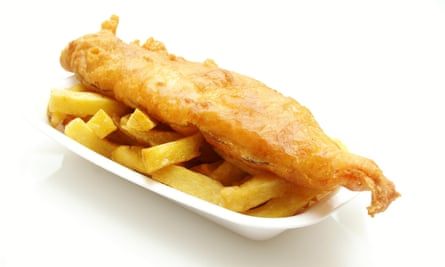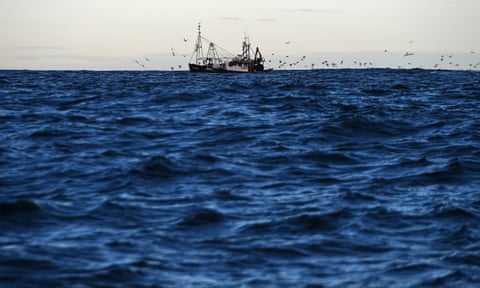By 7.30am all the cod at Peterhead fish market had been sold, snapped up by competing buyers wearing thick fleeces, woolly hats and rubber boots against the chill of the vast indoor warehouse.
A gaggle of middle-aged men clutching books of brightly coloured “tallies” followed the auctioneer alongside crates of glassy-eyed fish nestling in ice. With a curt nod or a swift hand gesture, the price was settled, tallies thrown down to indicate the fish’s new owner, and the group moved on. It took less than 10 minutes to dispose of the night’s catch.
Most of the fish would be heading south, to England or mainland Europe. The Scots are not big cod eaters, preferring haddock with their chips. This dates, apparently, from pre-refrigeration days: haddock is a fish best eaten really fresh, whereas cod is tastiest a couple of days after being caught.
The Peterhead buyers were cagey about naming their customers, but the fish they purchased was destined for supermarkets, fishmongers, restaurants, and a few of the classic takeaway chippies that are a national institution. But all this could now be under threat: a report published last month by the International Council for the Exploration of the Sea (Ices) revealed that North Sea cod stocks had fallen to critical levels. Warning that cod was being harvested unsustainably, it recommended a 63% cut in the catch – and that’s on top of a 47% reduction last year.
Independent auditors are reviewing the Ices report, and by late September they will announce whether the fisheries can retain their Marine Stewardship Council (MSC) certificates of sustainability – issued only two years ago – or whether those certificates will be suspended. Depending on the decision, North Sea cod could soon be off the menu.
At Peterhead, Europe’s largest white-fish port, the cod haul was small, perhaps half the amount of the previous night, causing a buyers’ scramble. “It fluctuates,” said an official, shrugging his shoulders.
Stuart Cowie, who has been in the industry for 20 years, said everyone was worried about the Ices advice. “There are too many merchants and too few fish.”
But Will Clark was more sanguine. The managing director of Wilsea had bought 37 boxes of cod that morning, he declared after consulting a small black notebook. The fish would be heading down “the spine of England” – the Midlands and London, which were “strong cod-eating areas” – and across the Channel.
“The fish will be with my customers by 1am or 2am, and in the shops by 7am or 8am tomorrow. People will be eating it anywhere in Europe by tomorrow lunchtime.” North Sea cod, he said, was “well managed. All stocks go up and down. It’s a concern, but we’ve been here before.”
And indeed we have. North Sea cod stocks were once plentiful but plummeted – and came perilously close to collapse – between the early 1970s and 2006. A “cod recovery plan” sought to restore stocks to sustainable levels by limiting fishing days, decommissioning boats, banning catches in nursery areas and putting larger holes in nets to allow young cod to escape.

In what was seen as a significant achievement, the stock rose fourfold between 2006 and 2017, when the MSC – on whose guidance big retailers and many consumers rely – awarded three fisheries sustainable status. The MSC’s distinctive blue label with a white tick was a huge fillip to the industry.
The UK consumes about 115,000 tonnes of cod each year. Only 15,000 tonnes comes from the North Sea, with the rest imported mainly from the fertile grounds in the Barents Sea and around Norway and Iceland. But the species is of huge symbolic importance to the UK fishing industry, which employs about 24,000 people – more than half of them working in Scotland.
Ices, an international organisation of scientists from countries bordering the North Atlantic, advises governments and the industry on stock levels and the sustainable quotas that can be fished without endangering future stocks.
It sounded a warning last year with its recommended cut in the cod catch of 47%, but this year’s assessment – based on extensive scientific research – warned that levels were dangerously low and another two-thirds reduction was needed.
“It is unclear what the reasons are for this; further work is required to investigate climate change, biological and fisheries effects,” the report said.
Environmental organisations point out that cod has been fished above its maximum sustainable yield in recent years, meaning the fish are taken from the sea faster than they can reproduce.
The species is not breeding as fast as it used to, too many unwanted “juvenile” fish are caught, and the practice of “discarding” – throwing dead fish back into the sea to keep within quotas – continues despite being banned.
With the end of the cod recovery plan, fishing vessels are now entering sites that have not been trawled for more than a decade, causing damage to the ecosystem, they say.
“This is a fishery that was on the road to recovery, but failures to reduce fishing pressure have led to serious overfishing and a reversal of fortunes for cod,” said Samuel Stone of the Marine Conservation Society.
“It’s a very harsh lesson, but this is why we need legally binding commitments to fish at sustainable levels, to effectively monitor our fisheries and to take an ecosystem approach to fisheries management. We have to properly protect our fish stocks for the benefit of our seas, coastal communities and consumers who expect sustainable seafood.”
The Marine Conservation Society, WWF and ClientEarth jointly wrote to the environment secretary on the day Ices published its advice, calling on the government to take urgent steps to secure the future of North Sea cod.
“As the country with the largest share [about 40%] of the North Sea cod quota, we require the UK to play a leading role in introducing emergency measures that minimise fishing mortality and maximise spawning potential. Only by doing this will the stock be enabled to recover,” their letter said.
Ices is an advisory body with no legal authority. Its advice will be the subject of negotiations between the coastal nations bordering the North Sea to determine the “total allowable catch”, or quota, for cod next year.
Brexit is a further complicating factor, of course. In the 2016 referendum campaign, the fishing industry became a symbol of the Leave campaign, which claimed it would be a clear beneficiary of its “take back control” message.
The EU common fisheries policy was held up as an example of European bureaucrats dictating to the UK fishing industry what it could and could not do in the country’s coastal waters. But marine experts point out that fish do not respect national boundaries, and therefore the industry needs coordinated international management.
“Species like cod are ‘shared stocks’,” said Phil Taylor of Open Seas, which works on protecting and recovering the marine ecosystem.

“After we leave the EU we will have greater control of how fishing takes place at sea. But the buck will then land squarely at the feet of UK and Scottish ministers. We may have greater control, but we will also have greater responsibility and accountability.
“It will be completely within the gift of our ministers – whether they take a short-term, smash and grab approach to fish stocks or manage these fisheries more fairly to protect the environment and yield the best long-term profit from the system. We require an urgent transition towards more sustainable seafood.”
Bertie Armstrong, chief executive of the Scottish Fishermen’s Federation, said the industry was “100% committed to sustainable fisheries for the very obvious reason that anything else would spell the end for hundreds of businesses that sustain so many of our coastal communities”.
The latest challenge on cod stocks could be overcome by “responsible, practicable measures”, he added. “It will not be easy, and many sacrifices will have to be made along the way. But we will succeed, and when this country is no longer in the common fisheries policy we will be able to set our own more meaningful and stringent sustainability goals and ensure that it is our fishing boats that will have first call on quota.”
The MSC acknowledged that the drop in cod stocks was “disappointing news” for the industry. But, said the MSC’s Erin Priddle, “it is imperative that effective measures are introduced to secure long-term sustainability of this iconic and ecologically important fishery … protecting North Sea cod for this and future generations must be a key priority for all involved”.
Consumers, said the MSC, could continue to eat cod it has labelled as sustainable. If the auditors decide next month to suspend the certificates, the change would come into force towards the end of October.
The impact of such a move will be felt mainly in supermarkets, fishmongers and restaurants where sustainability is an important factor for conscientious consumers. In the nation’s chippies, 90% of the cod served is imported. “There will be less UK-caught cod, but even before the Ices advice, we’ve always imported most of the seafood we eat,” said Aoife Martin of Seafish, which supports the UK seafood industry.
A “huge variety of amazing seafood species” was caught by UK fishers, she said, but about 80% was exported. Monkfish, scallops, lobster and crab were in demand in Europe and Asia – “Koreans love UK whelks” – but “either we don’t catch the fish we want to eat here in the UK, like tuna, or we don’t catch enough to meet demand, such as cod”.
According to the National Federation of Fish Friers, one in five Britons make a weekly trip to the chippie. But big hikes in the price of fish in the past few years are putting the industry under pressure.
“Every day shops are going up for sale. A lot are really struggling, but it’s tight for everyone,” said Andrew Crook, the federation’s president.
The first fish and chip shop is believed to have been opened by Joseph Malin, a Jewish immigrant, in east London around 1860. Another businessman, John Lees, is also credited as a fish and chip pioneer, selling the dish from a wooden hut at Mossley market in Lancashire as early as 1863.

It soon caught on. By the 1930s, the number of fish and chip shops across the country had reached about 35,000. In The Road to Wigan Pier, George Orwell credited the ubiquity of much-loved fish and chips as one of the factors in averting revolution.
During the second world war, the government ensured that fish and chips were never rationed. Winston Churchill described the constituents of the dish as “the good companions”.
Traditional takeaway fish and chips, seasoned with salt and vinegar and eaten with fingers out of newspaper wrappings, sometimes accompanied by a pickled onion, have long been superseded by polystyrene cartons, plastic forks and sachets of sauce.
Now the dish is also served in miniature portions at glamorous parties, and it has a place on the menus of expensive restaurants as well as pubs and seaside cafes.
Fish and chips is ingrained in the nation’s identity, said Crook.
“You remember eating fish and chips with your grandparents on the seafront in Blackpool or Margate, but you don’t remember your first kebab. There’s a romance to it, and a sense of theatre, as well as being a comforting and nutritious meal.”
The looming Ices decision on cod could, however, take its toll. At a cafe in Peterhead run by the Fishermen’s Mission, Kyle Wood said that if cod was deemed unsustainable, “supermarkets will take it off their shelves”. “There’ll still be fish and chips, but there’s bound to be an impact on price and availability,” he said. “It will be a big struggle for the industry.”
